David Roberts is a renowned American climate and energy reporter, a longtime reporter at Vox now running his own independent Volts podcast on Substack.
In the interview below, this writer’s questions and comments are in bold, Mr. Roberts’s words are in regular text, and extra clarification (links, etc) added after the interview are in bold italics or footnotes.
You have been observing the American energy and climate politics landscape for years. In this crazy moment, we’re seeing maybe an all-time insane attack on not just efforts to deal with climate change, but on concepts like science or objective reality or the idea that national competitiveness and technological advancement is desirable at all.
But simultaneously, we're seeing this incredible, historic surge in clean energy. Solar and wind provided 97% of newly built US electricity generating capacity in January and February this year, even as Trump was starting. We're seeing huge surges in clean energy around the world, most of that made in China, but some of that made elsewhere as well.
We're seeing the dawn of a potentially huge US geothermal industry if we don't screw that up. There’s a lot happening. What’s your overall “from 10,000 feet” perspective on how things have evolved?
Well, I mean, just in terms of the bill [the Republicans’ under-discussion mega-bill that appears poised to drastically slash clean energy tax credits among much else] I think the main lesson to take from how this played out is this. Everybody has been arguing over, do they value the energy credits because they funnel money into their districts, into their states? Or are they ideologically opposed to the tax credits because they just hate renewable energy and love fossil fuels? How do Republicans feel about clean energy and the clean energy tax credits? That has been the focus of the debate. What has become clear is that in this Congress, the primary focus, dwarfing all others, is making the Trump tax cuts permanent.
Note: a major topic of this interview is the ongoing Republican budget negotiations (aka the “one big beautiful bill.” This is a complex and fast-changing situation. The Republican majority in the U.S. House of Representatives passed an astonishingly terrible version of this bill on May 22, sending it to the Senate, which also has a Republican majority. Last week, the Senate released early proposed changes to Trump’s nightmare budget (which remains incredibly horrific overall), and they appear somewhat less terrible for clean energy (or maybe not?!). The situation is still very much in flux! Politico is publishing hour-by-hour updates on how this is changing, and almost anything written about this bill will become outdated to some extent within a day. Most of the charts and figures in this interview primarily refer to the House version of the bill.
Working backward from there, you need revenue. Medicaid and SALT are the big points of contention in the caucus related to that. What everybody got wrong is not that they have this or that strong feeling about energy tax credits, but that they just don't care about them much. They just don't care about them as much as they care about other stuff.
They needed revenue to pay for the tax cuts, so they wiped out all the energy tax credits to find revenue. It turns out they just want revenue, and they don't give a shit one way or the other about the energy tax credits. There are no complicated arguments. There's no depth here. They needed revenue.
Just to summarize – I mean this is not something that should have surprised anyone who's watched the Republican Party for the last six decades - they care about tax cuts for rich people more than anything else. Biden's entire energy agenda is basically an afterthought, a footnote. They're wiping it out root and branch just to get revenue to give back to rich people. So it turns out they just don't care about energy much one way or the other.
A lot of what I find to do with my newsletter is tell people in the U.S., in both an encouraging way and a you-need-to-get-your-act-together way, that the U.S. is not the entire world and other stuff is happening elsewhere.
And that’s good news in a lot of ways, but that also makes this is maybe the worst time in history to cut energy tax credits from a U.S. nationalist perspective. Everything's orienting around batteries now. Even if you believe climate change is a hoax, even if you're deep in the right-wing media sphere, just from a basic national security perspective, let alone the jobs in all these Republican districts, the world is increasingly shifting to run on batteries. China's now the world's biggest car manufacturer and exporting to the global south. The Ukrainians just did a huge strike deep in Russia with cheap battery-powered drones. We really, really need domestic battery manufacturing, even if there was no such thing as climate change.
They don't seem to care about that either. That's the thing that really shocks me. I would have thought there'd be a couple national security hawks or something!
Again, it's not like it's bad for wind and solar companies, but good for someone else. It's not good for anyone! I mean, this is the remarkable thing, and I tried to get at this with my interview with Senator Heinrich. It's not like normal politics, where there are horse trades going on, and people are getting what they want and giving up things in advance. No one wins.
No one wins in this bill except for the tiny number of rich people who are getting tax cuts.
Wind and solar aren't benefiting, but neither is hydrogen, which they claim to like. Neither is CCS. Nuclear is getting hurt. Oil and gas? Even with all the sort of symbolic concessions to oil and gas in the bill, if you look at the modeling, if you look at it concretely, they can't force the price of oil and gas up to make it profitable to drill here, so there's not even going to be much oil and gas drilling out of this.

It is genuinely mysterious to figure out who benefits from this. It's obviously bad for the reasons you say. It's bad for a bunch of other reasons, but it's not good for any compensating reasons! It's bad in all ways for all people.
And the only thing that is holding it together, despite that, is the power of Trump. The power of Trump as a personality. This is what Heinrich was saying. The normal rules of political physics have been suspended. You try to figure out who benefits, whose interests are on the line - that mode of analysis is useless here. There's just Trump's demands, Trump's force of will and the cult-like party that is carrying out his demands. No one, including the Republicans voting for it, is benefiting from this bill. That is the remarkable thing.
Yeah, they're all voting for stuff that's going to close factories in their states and districts!
[Thirteen] House Republicans signed a letter saying, please don't cut the clean energy tax credits. Please don't pass the bill that we just voted for! Republicans saying out loud, we oppose the bill we just voted for! What does that tell you?
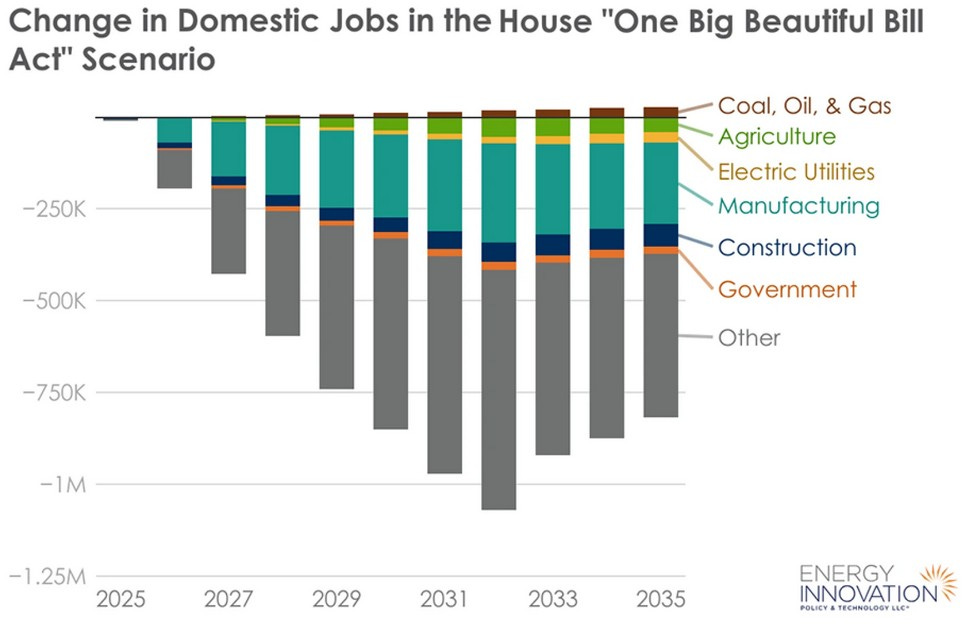
That people are afraid. That the profiles in courage in the Republican Party, like Mitt Romney and Liz Cheney and Adam Kinzinger, got drummed out of the Republican Party.
One Republican who didn't vote for the bill said that he opposed the bill, but he didn't vote for it because he pretended to be asleep. During the vote [in the House in June] that's the one “profile in courage” on the Republican side. One of them pretended to be asleep so he wouldn't have to vote for this thing. That's the bravery you can find.
So now a bunch of them are basically saying out loud, “We're too chickens**t to vote against this thing, but we know it's awful. So please, Republican senators, show the courage that we didn't show and vote against it.” They had a one vote majority in the House. Any one of those Republicans could have just stopped the bill, but they didn't, none of them.
So the only question here is, will Republican senators show any spine? Will Susan Collins go beyond being concerned? Will Murkowski actually do something this time? Will Rand Paul actually do something?
Maybe John Curtis. He's been saying some vaguely sensible sounding stuff.
If you want my prediction, no, they're all going to be utter cowards. That's what they've been, you know, from the second Trump popped up. They are exposing themselves as cowards too terrified of Trump to do what they know is right. We all knew that, but at this point they're saying it out loud.
I don't know if you saw this, but analyst Michael Thomas, on his Substack Distilled, shared a poll. 23% of Americans have heard nothing at all about this mega-bill, 46% have heard a little about it, just 30% heard a lot. Only 50% had heard about the cuts to clean energy tax credits.
Most Americans just don't have a clue! They didn't know what Biden was doing. They never knew what he did. They don't know Republicans are undoing it. This is the other big aspect of all of this. Republicans, the right, have basically...
Controlled communication.
The information environment. The mainstream press outlets still exist, but the right took over everything else. With decades of patient investment, they took over Fox, talk radio, local newspapers, local TV stations, cable news, social media, bro podcasts. They went over and took over culture, and the information environment now is just broken and diseased.
So how would Americans know that Biden painstakingly helped assemble and pass an incredibly good bill that would do incredibly good things? Who's going to tell them? They don't read the New York Times. If they get news at all, maybe it’s just drifting through their TikTok feed, one source just as good as any other.
The people who want to solve climate change, in this information environment, no matter how clever their messaging or whatever they want to say, they just don't reach people. People don't hear them. And so people don't know what's happening.
Biden's whole theory of the case was that if I do things that concretely make people's lives better, I'll be politically rewarded.
And it turns out...
You can do things that make people's lives better and they don't see it or don't believe it or don't attribute it to you.
They don't know it. Those things don't tell their own story. My life can get better because of a Biden policy, but I probably don't know it until somebody is in my media, somebody is in my information feed telling me what to make of it. And there's no basically pro-left, pro-democratic voices out there doing that, out there in the sort of podcast, short video, YouTube world of information people live in. Right-wing messages dominate all those media.
So, yeah, people got a lot of stuff from Biden, and now they're getting it yanked from them, and they don't know.
They didn't know then, they don't know now, they don't know what to make of it. The number of people who have an accurate understanding of what has gone on in the last few years is tiny.
The polls and surveys show this very clearly: to the extent you still get your news from legitimate journalistic mainstream outlets, you vote Democratic. And to the extent you don't, to the extent you either get your news from social media or you just don't get any news at all, you vote Trump. It's very stark. It's very clear. The people in this country who are still informed, who still know what's going on, are voting for Democrats. The people who are voting for Republicans are in a bunch of little hallucinatory weird right-wing media bubbles where they just don't know what's going on. You can't solve anything else until you solve that.
That communication problem is kind of what I'm trying to solve, by presenting accurate and truthful information about real-world issues that’s also hopeful and positive so people are encouraged to read it. Imagine what it’s like to be a young person now, someone my age who didn’t have the luck to have the epistemic education I had, practicing how to tell if is something a reasonable source to trust. If you're just scrolling through TikTok, maybe you see one video that says “The president wants to be a dictator and this is really bad,” and you see another one that says “America is strong under President Trump. Chill out and have a beer.” And to you, those are just menu options, you feel you have no way of really knowing which is closer to reality. I kind of get why some people are picking the more comfortable one.
Let me add something to that. Also, this person has been raised in a culture where every signal to you is telling you, you're the consumer, you're always right, our job is to give you what you want. The job of online, the job of apps, the job of food delivery apps, the job of Amazon, the job of everything is to make things easier for you, ease any burden, ease any friction. People take that mentality into epistemology.
They think, “I'm the consumer, I deserve the information that makes me feel good.” They're like, I deserve to have my personal information bubble, algorithmically designed to flatter my priors, to tell me what I already think, to make me feel good, to give me people to blame for anything that's wrong for me. But reality is stiff and resistant and often tells you things you don't want to hear and often does not fall into your neat categories and almost always will defy you and you're almost always wrong anytime you have a simple story.
Now everybody out on the internet is just like, who do I trust? I've been thinking about like evangelical Christianity, on the upswing, resurgent, etc. If you're hostile to science because you prefer revelation, how do you figure out who to trust? Like if one guy comes to you and says, Jesus told me to do X, and another guy comes to you and says, Jesus told me to do Y. You have no scientific method, you have no empirics, you have no facts to check against, so how do you decide between them?
The answer, and this goes way back in evangelical Christianity, is charisma. They literally call it charismatic Christianity because it’s about who is compelling to you in the absence of any objective way of assessing information It's just about who makes the best pitch, who is more charismatic. And that method of determining what to believe going on charisma has breached evangelical Christianity and has taken over all online. Young people raised online, whether explicitly or not, are marinating in that. Whose information do I believe? Who's got the best pitch, who's got the best talk.
If you're just determining truth based on charisma, you are at sea and you are a target for charlatans. Which is why right-wing politics is always ridden with fraud and grifters. You're literally training people to not have any objective grounding for their beliefs! A group of people trained that way is a group of suckers to whom you can sell gold and nutritional supplements and prepper packages and whatever else you see sold anytime you go to a right-wing blog, right-wing media, right-wing podcast. Anywhere you go and find right-wing content, you also find bullshit scams, because those people have been bred as targets.
This is why we invented science, for f**k's sake! This is why the enlightenment happened, right? We figured out that we can't just go on believing one charismatic person and then another and then another. We've got to have something other than our feelings. What's real is what you and I can independently replicate, right? The shared world, the basic rules of science.
We're not talking to young people about the merits of science. We're not talking to them about the merits of democracy. And so they have no particular reason to prefer those things. If you're just going on feelings, if you're just trained from the word go that everything is supposed to be algorithmically tailored to you, you're not gonna go to science on your own. Because science, legendarily, is frustrating because what you want to believe often doesn't turn out to be true. It bumps up against your beliefs and tells you you're wrong.
The right wing in the US set out to destroy trust in mainstream truth-finding institutions. Science, journalism, the academy.
It set out to destroy public trust in those institutions so that we would be in an epistemic wilderness, which makes people insecure. And when people get insecure, they look for a strong man to attach to. This is authoritarianism 101. Destroy trusted sources of information, people will get anxious, and when they don't know what to believe, they don't know what's true. They think everybody's lying. They think everybody's bullshitting. They are perfect authoritarian subjects because then they'll just be thinking, who's the biggest, strongest team I can be on?
They've been doing this for six decades in the U.S., in full view. Back in the early 2000s, the right-wing media was sort of a fringe. But it was dangerous.
I agree. I'm trying to build a career in that media environment. And my theory of the case, the thing that's given me what little traction and success I've had so far, is to tell a story of hope because there also is a lot of hopeful stuff out there. I want people to come away from the stuff I write feeling good. I want that to appeal to a media consumer and use that appeal to spread true information.
Your Volts podcasts also have a really intrinsically hopeful vibe because, they're talking about good people doing good things.
What you hear from people on our side is we need to create better consumers, right? We need more critical thinking. We need people who are better equipped to discern good from bad information. And while that is true, while obviously it would be better if people were better at doing that, I just don't think that that is a road to mass epistemic health. Most people most of the time are going to be ignorant about most things. That's just life, most people don't pay attention to most things. You have to have institutions that do the truth finding for you that you trust. I don't know how to get back there.
One thing that's been giving me hope in these times is that old Stephen Colbert quote, “Reality has a well-known liberal bias.” Like, the fact that solar power is now the cheapest form of energy in history remains true no matter how bad the information environment gets. The fact that the world is warming remains true no matter how bad the information environment gets. If you live in that charismatic right-wing media ecosphere, you're used to being able to change everything around you to fit your beliefs, but in the real world, stuff happens that is that is governed by other forces. Physical forces like atmospheric physics or solar panel engineering, and other things like market forces, but stuff that has some objective reality.
So worst case scenario, assuming total federal governance dysfunction, what are the bright spots for how we could still make progress in an America where the clean energy tax credits are gone? Governors like Pritzker are doing stuff on the state level. There's a geothermal industry bubbling up that has potentially amazing widespread value and is already selling to data centers and stuff. Pakistan, which is more dysfunctional than we are, just installed a huge amount of Chinese solar. There’s this potential for very positive stuff to happen at an economic, grassroots, and cultural level, even if institutions are captured or really screwed up.
There is no real substitute for federal money. State budgets are always tight, everybody's always fighting over money. We can't do the Inflation Reduction Act without the federal government on our side, and it's now against us. But there are obviously still things to do at the state level. I would point to, as I always do, public utility commissions. State level bodies, largely ignored, right? A little bit of attention feels like a lot to them, so they're very subject to pressure, and they have their hands on the whole energy system. And we desperately need utility reform.
Here's what I will say as a piece of good news. The arrival of data centers on the scene, it's not all positive effects, but one positive effect it is having is shaking up a debate that had gotten somewhat stale. Now everybody agrees we need lots more electricity really fast! Electricity demand is already going up. It's going to go up more, with data centers and then beyond that, you know, electrification of transport, industry, heating and cooling, et cetera.
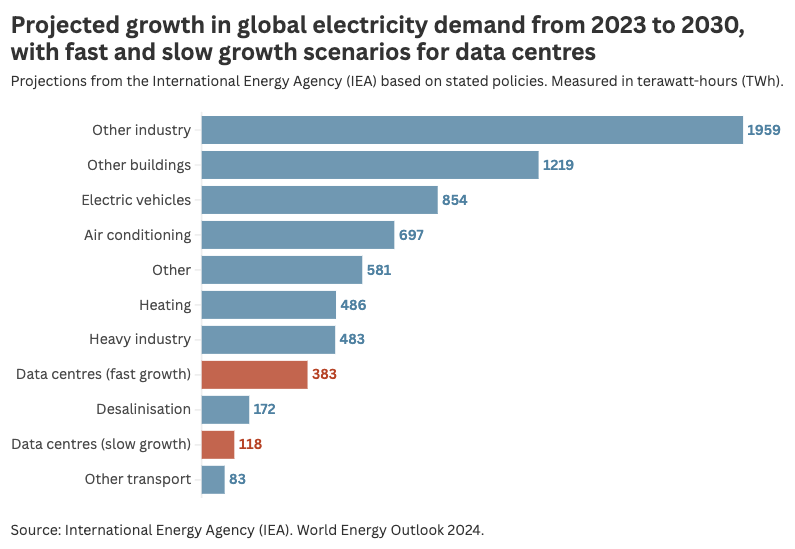
Electricity demand is going up. And furthermore, the people who need all this new electricity are not hippies. They're not green anything. They're big, wealthy tech companies who people pay attention to.
And right now we're in a situation where if you want a lot of electricity quickly, well…you can't build nuclear plants quickly. The gas power plant supply chain is choked right now. You're not going to get a gas plant before 2030! Best case scenario, five years out. That's way, way beyond what they need. They need power now. So where can you build power fast? How do you get fast power? Renewables are faster than gas, and the only thing faster than renewables is virtual power plants, i.e. coordinating the spare capacity that already exists in existing buildings. We're at a point where the logic of the situation, just the money logic, the sheer capitalist logic of it, demands that we create a bunch more renewable energy and VPPs. Whether you give a shit about pollution or not, if you want more electricity quickly, that's where you get it. That's where you can get it. There's no other place to get it. We're literally at a point where the physical world is basically forcing people to build lots more renewables and batteries and VPPs, whether they care about climate change or not! This is what I'm really excited about.
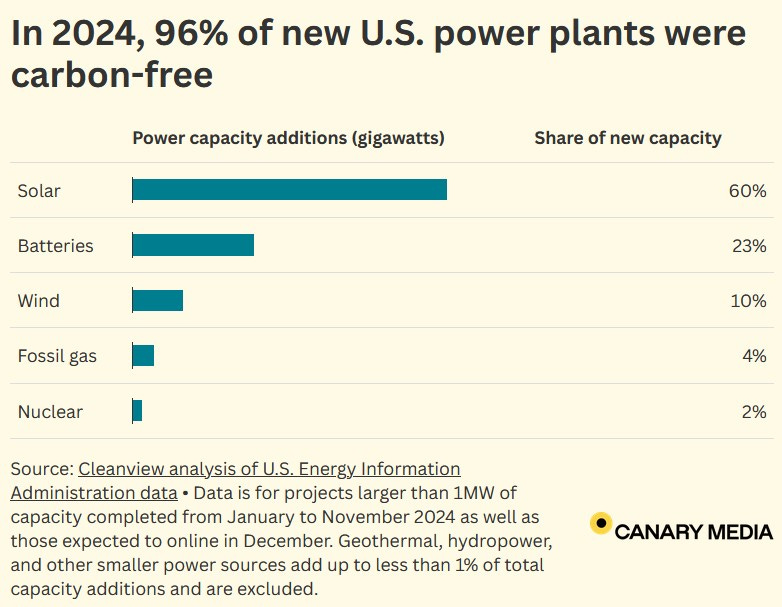
Yeah!
That logic is going to play itself out. These companies, your Googles and Metas, they're full of smart people. They know the energy world. Their executives are having a little bit of irrational exuberance about the possibility of small nuclear plants, but they're all going to discover what everybody discovers when they chase that, which is “Oh, these are actually quite expensive and they take a really long time.” The logic of the situation is going to lead them to renewables and VPPs. That is a powerful, capitalist force on the side of clean electrification. So that's going to play itself out.
As you say, there's a certain inevitability to all this. The right's vision, and I think, honestly, the American oil and gas industry's vision now, is “We get that this transition is inevitable. Let's wall America off and drill as much as we can before the end.” Basically fortress America, lifeboat America, f**k everybody else.
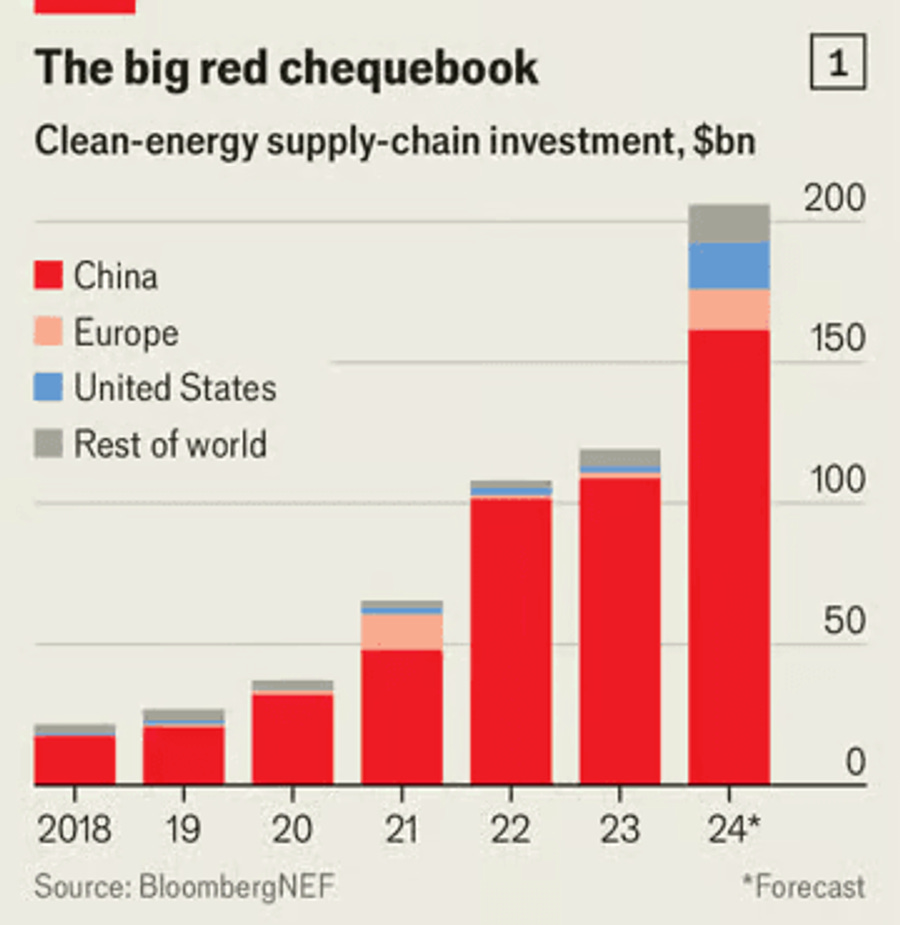
Like, China's electrifying. China dominates all these clean energy supply chains. Biden's solution was “Let's build a domestic supply chain!” Everything in this bill would destroy that domestic supply chain.
So it looks like the right’s vision is just, “Let's just have an oil and gas party until we lose. China's gonna win, let's party until that happens.” It's a very nihilistic, declinist version of things.
And this is one thing, in terms of communication, in terms of optimism, that I think is a very important rhetorical and ideological and sort of philosophical pivot for the people on our side to make. You’re probably familiar with this fight. Abundance. The legacy of the environmental movement is degrowth. We need to be the party of abundance, but the vibe of the environmental movement is degrowth.
That's changing. It's very mixed on the ground. But we need to make the pivot to abundance. And the message is, if you have real aspirations for humanity, beyond just “let's live comfortably,” if you want to desalinate unlimited drinking water from the oceans or turn deserts into agricultural land or go to Mars or any of these big things you want humanity to do, we can't do that with fossil fuels.
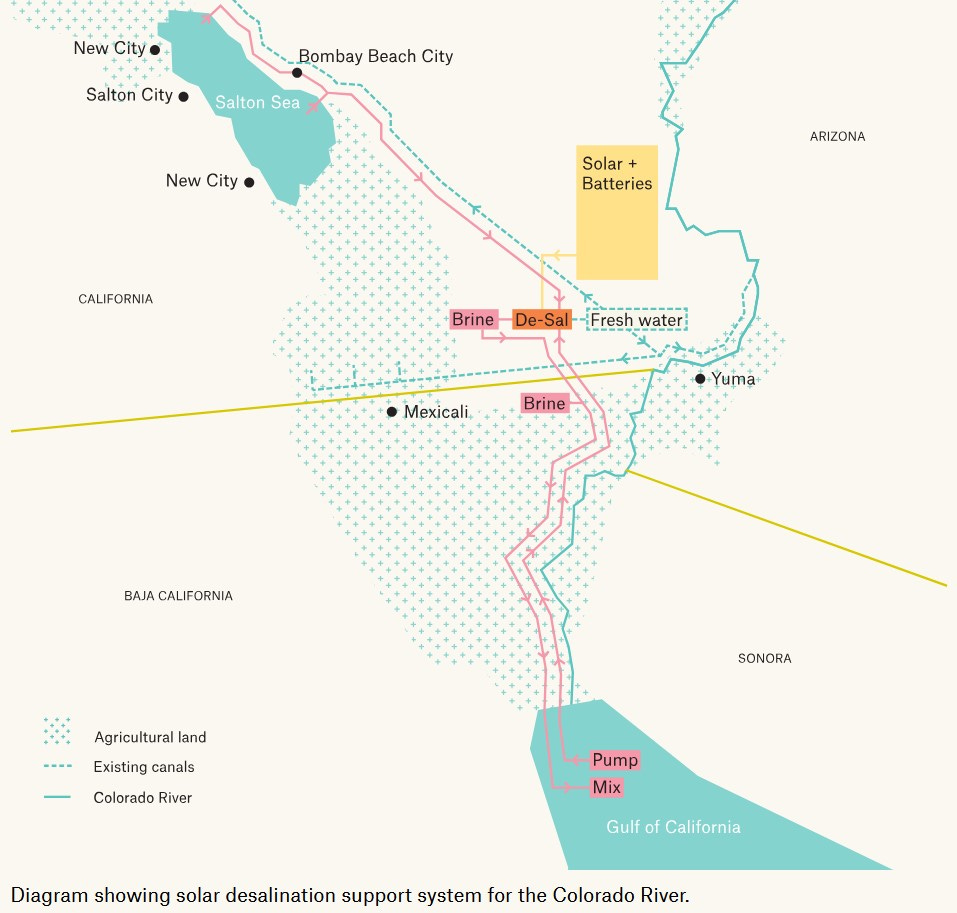
We just literally physically can't. If we try to like 2X or 3X the amount of energy we use, with fossil fuels, we're just going to burn ourselves up into a cinder.
If you want humanity collectively to use two or three or four or a hundred times more energy, which is what an optimistic future-facing person has to hope, there's only one way to do that. You have to use solar energy. You have to start using the kind of energy that doesn't run out and that doesn't burn up when you use it.
The problem is that the association of environmentalism with degrowth in the public imagination is so deep and so long-standing. It's one of these deep myths, these deep narratives that people echo without even knowing they're doing it. You know what I mean? They've been repeated so long that they just become common sense, “everybody knows,” right? Changing those narratives is very hard. You have to really throw yourself against the wall and repeat yourself over and over and over again. That's how they did it. That's how we have to do it to change that narrative. It takes a long time but that to me is the key pivot that our movement needs to make.
If you want a big, bright, prosperous human future, you have to get off fossil fuels. They are an anchor limiting humanity. If you want unlimited energy for humanity to flourish, the sun is the source of that! On the abundance fight, we win that fight.
Yeah, absolutely.
There's no fight that fossil fuels wins other than “let's build walls and just enjoy our decline, let's just burn as much fossil fuels as we can while China takes over the world,” basically.
And if you make that choice clear to the U.S. public, they will be on our side. It's just not clear, for all the reasons we've covered already. We don't have the ear of the public, so where would they hear that?
This is what I want to start pointing the show more towards and just talking about more. If climate change were not happening, the entire clean energy transition would still make 100% sense. It is entirely possible to justify the clean energy transition without any reference to climate change. Eliminating particulate pollution alone more than pay for the energy transition, to say nothing of what's going to happen to geopolitics when you don't get to be a global power just because you're accidentally sitting on top of oil deposits! What if every country is self-sufficient energetically, they can all produce their own energy? The whole geopolitical dynamic of oil dominance gets scrambled.
If you want a better world, we're the one on offer. They have nothing to offer, which is why all their rhetoric is about going back, restoring, making America great again. All they have is an imagined world, a lie about the past. If you want the future that's clean energy, that's us. And that message is not getting through to the general public. They do not yet associate abundance with clean energy, and that to me is like the key. It's what everybody needs to be working on, all the time.
I absolutely agree. And that's what I'm trying to do! I'm trying to bring back a little bit of whiz-bang techno-optimism, sort of 1960s Raygun Gothic style, and apply that to renewable energy and the fight to solve climate change.
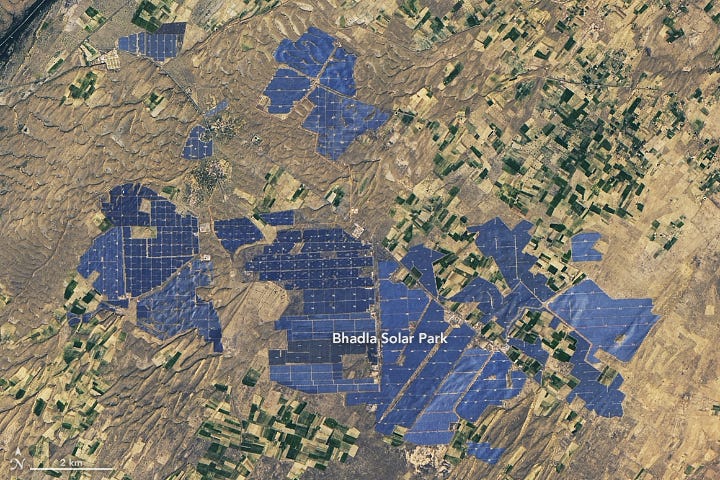
Like, “Damn, look at this giant solar farm, isn't that cool?”
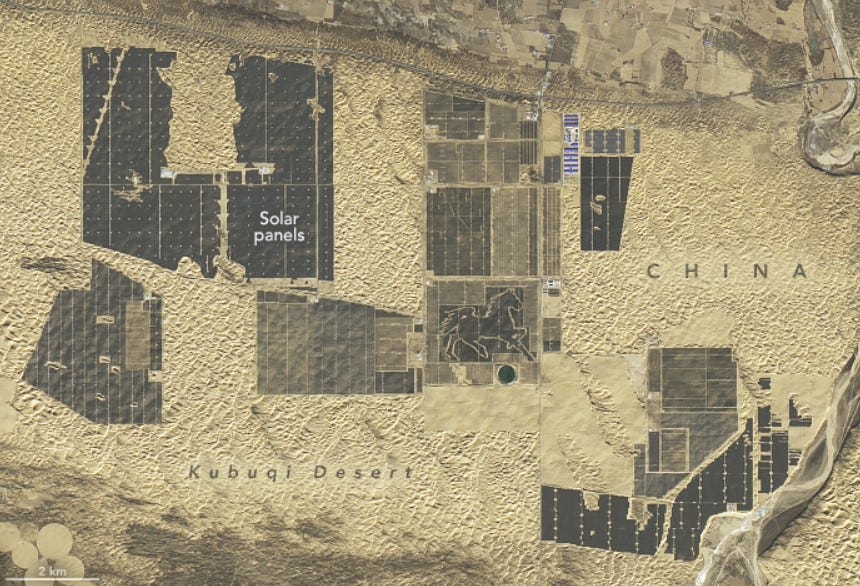
Look at this solar farm where birds are nesting under it and sheep are grazing under it and you have a life-rich environment that's also generating clean power with no moving parts.
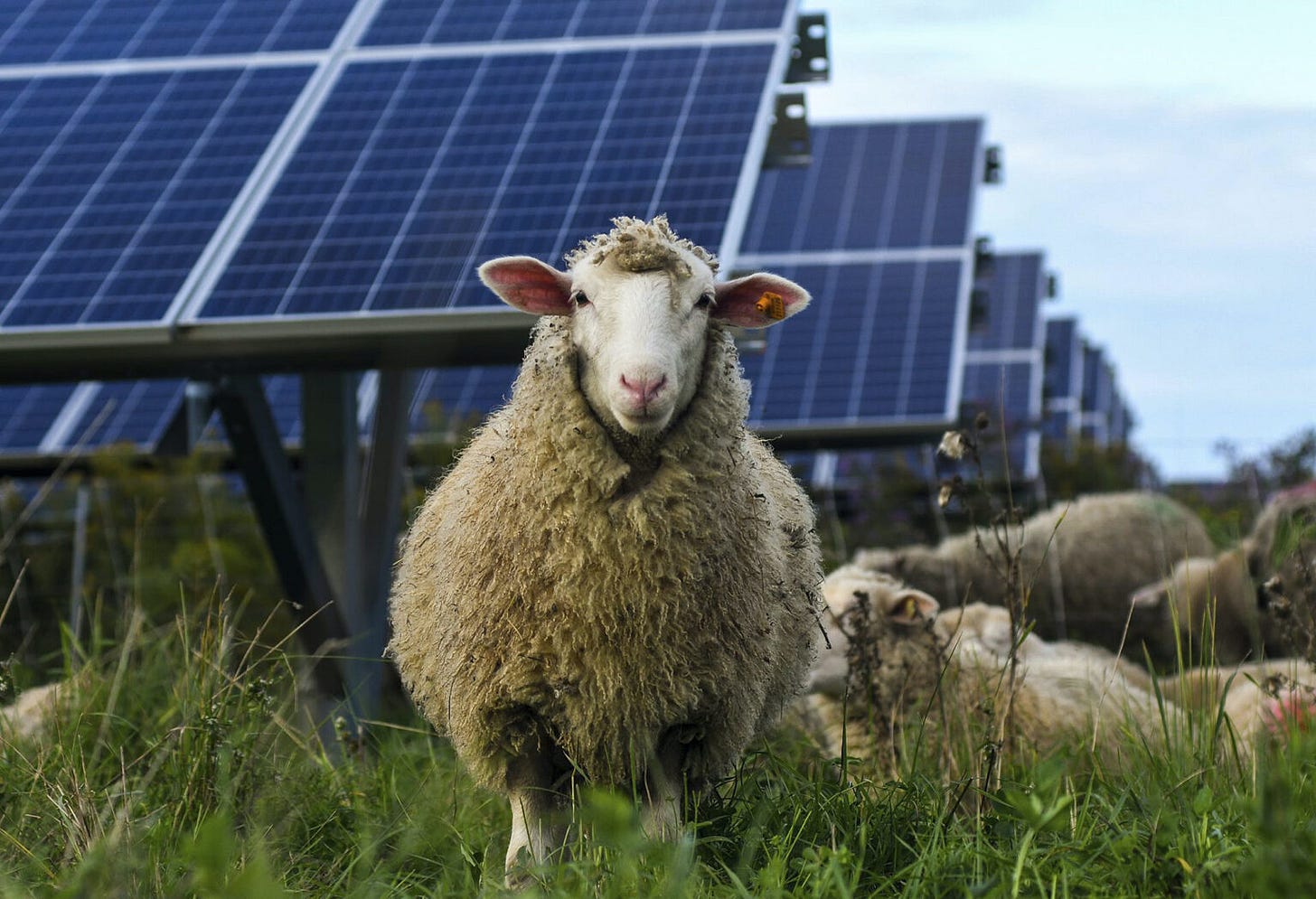
Look at this huge freaking battery that can power a whole city!
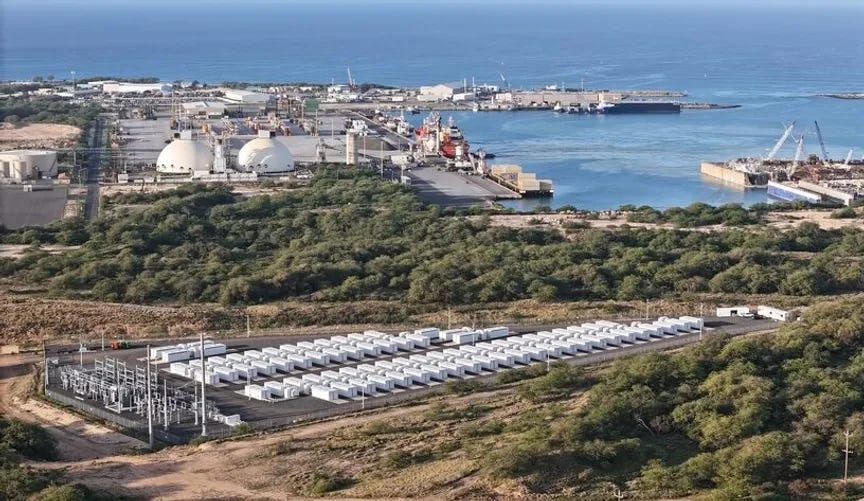
I'm trying to share hopeful positive stuff that also just intrinsically, on every level from the visuals to the writing, inspires people to have positive, fun, optimistic future-y feelings about clean energy. I'm trying to build those new associations.
As you say, in America back in the 50s and 60s, we sort of owned the future, the future was very present. It was all around us, we were all excited about it. And we completely lost that, completely. Ask an average American normie, “What is a good future?” We don't have a shared one anymore. We've completely lost that, and that is a gap to be filled. It's a space to be filled, and the physics of the situation are such that clean energy is what has to fill it. Everybody needs to be doing that.
But just because we have a positive vision for the future doesn't mean that all our content has to be positive. Whether you like it or not, what grabs people is outrage and conflict. We have to both have a vision for a positive future and we've got to produce anger and outrage at the villains, too. We need people angry at oil and gas companies, and not because they're putting oil on the waterbirds or they're hurting Mother Earth. Most people don't care very much about that. What they're doing is preventing us from having a much cooler and more prosperous and more whiz-bang future. They are between us and the whiz-bang future. We need to turn anger and outrage at them, not because they're big meanies who don't respect the whales, but because they're grandpa standing in the way of your cooler shit. They're like grandpa with his fax machine who has been like grandfathered into your office so no one can get rid of him, and he won't let anybody else use anything other than the fax machine. You know what I mean? That kind of vibe.
They’re old rich shitheads forcing us to use old fashioned dirty shit. Because the new, better performing, more fun, cleaner stuff doesn't make them a bunch of money. That's something the public can get mad about!
Yeah! I'm not trying to present a pie in the sky “everything is fine” message, I'm trying to show people that there's stuff to be fighting for, not just against. I'm trying to show people that there is this vision, that clean energy powers an awesome future, it’s not a luxury good or a thing we have to do to prevent disaster. It's an opportunity. It's a positive. It's a thing to get excited about. That's what I'm trying to do.
It's great that you're doing that. What we need is a lot of patient capital investing in people like you and creating infrastructure for people like you. Just on the L.A. protests, if you go on the ground to those, you will find dozens of right-wing influencers, who have millions of followers on TikTok or YouTube or whatever, all out there, very concerted, all sharing the same message. “Social disorder, social disorder, be scared, cling to the strongman.” It's barely even political ideology. It's more just a feeling, “There's chaos, be afraid, be afraid. These people who are not like you are making you unsafe.”
There's dozens of them on the ground doing that. And they're all f***ing funded! They're all making a good living because there's just a crap load of money on the right for people like that. They can all devote themselves to it full time.
Then you hear from liberal influencers on the ground, there's barely any, and they're all paying their own way. No one's helping them. They're all doing it out of the goodness of their hearts, but they're all sacrificing to do it. And this, to me, is the problem in miniature. The right has money and infrastructure set up. They don't go to these right-wing influencers and say, here's a conditional three-month grant and to renew it, you have to file 50 forms and show that you've hit X, Y, and Z metrics. They're just like, here's money. Go do your thing. And they send hundreds of them out. They've got a bunch of people sharing their message peer-to-peer on the media that people actually use and are on.
And what do Democrats do? They see these things happening in L.A. They hire a consulting firm to go do some polls to find out what the public thinks about this, and then they take those polls and they work backward to a very carefully constructed message that they all then go out and say in a press conference. And it just sounds to everybody these days like a message that sounds false and constructed and inauthentic and slow and just sort of beside the point. The way the Democrats communicate is designed for everyone to ignore.
And to me, what's going on in LA is just a perfect encapsulation of all the dynamics, The facts of the situation are on our side. If you understand the facts of the situation you have one view, but like if you're just marinating in YouTube propaganda you have another view. Our side is not getting the message out there.
Well, we're trying. We’ve gotta keep trying.
I realized that since the information sphere has fractured so much, there's not a main channel anymore, really. There's not a thing that everybody's watching and everybody shares. So always now, for any group I'm talking about, you have to think: what is their epistemic bubble? Who or what is their algorithm? This is what I think about liberal billionaires all the time. What is their algorithm? Who is surrounding them? Who are the voices that they're listening to that are constructing their worldview? And how do we get better information into that epistemic bubble?
It’s almost like a science that doesn't have a name yet, you know what I mean? Sort of like…epistemic anthropology? Find a group, then find out what is the nature of their bubble and how can I get into their bubble, which is a very different thing to do than “how can I simply broadcast and hope that a mass audience hears it?”
To some extent, I have cultivated an audience now where there are enough influencers in it that I think at least some of those people get it, or at least get it a little bit, but not much.
And everybody I talk to who talks to the money people on our side is frustrated beyond words. It can't be that saving the world is gonna be a f**king volunteer project for people who are willing to sacrifice income to do it. If you want to build a saving the world machine, you need to professionalize it. You need to stand it up and it needs to be funded.
I agree! Well, thanks for the chat. Stay strong in these tough times, and thanks for doing what you're doing.
Thank you.



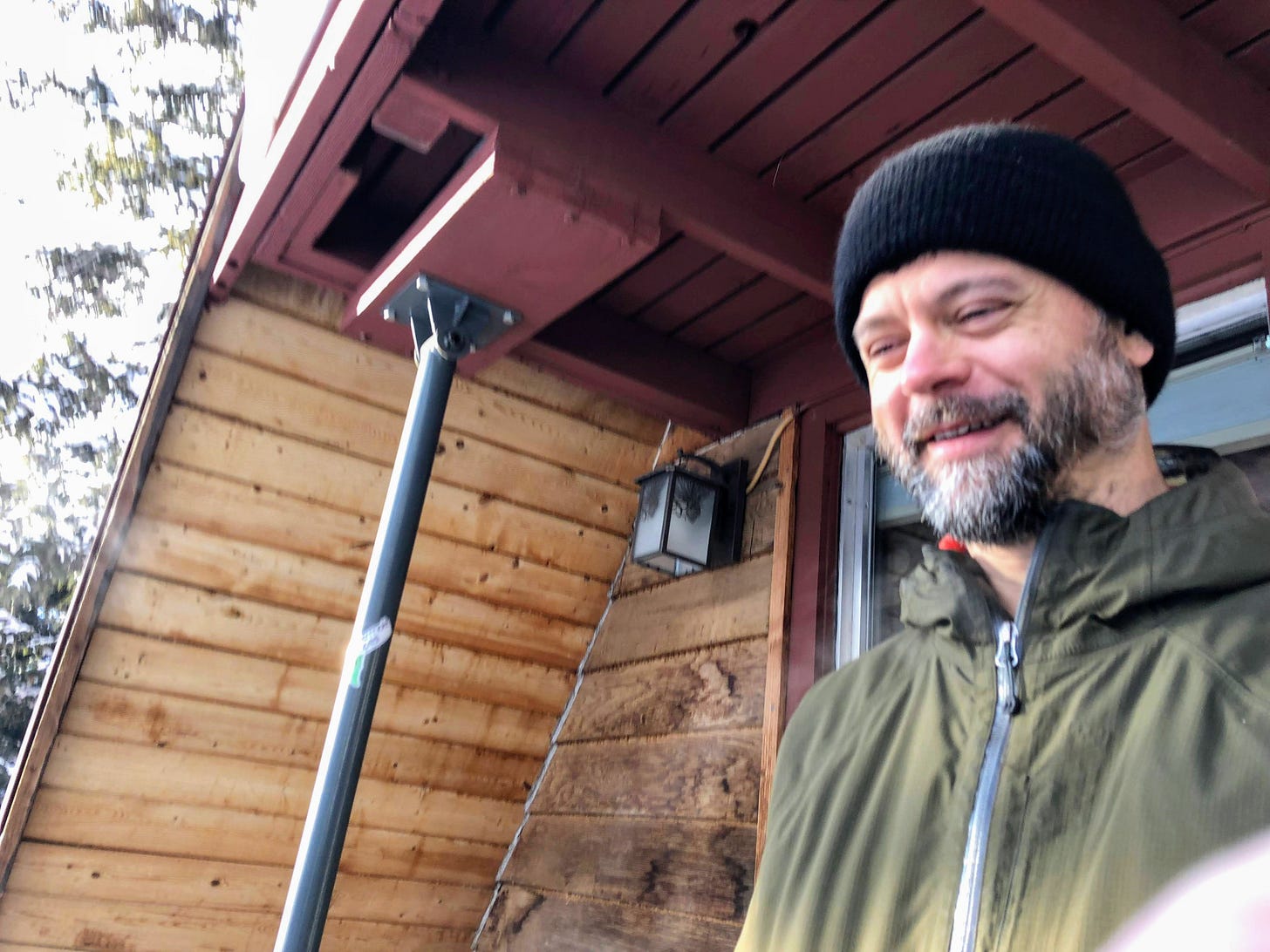

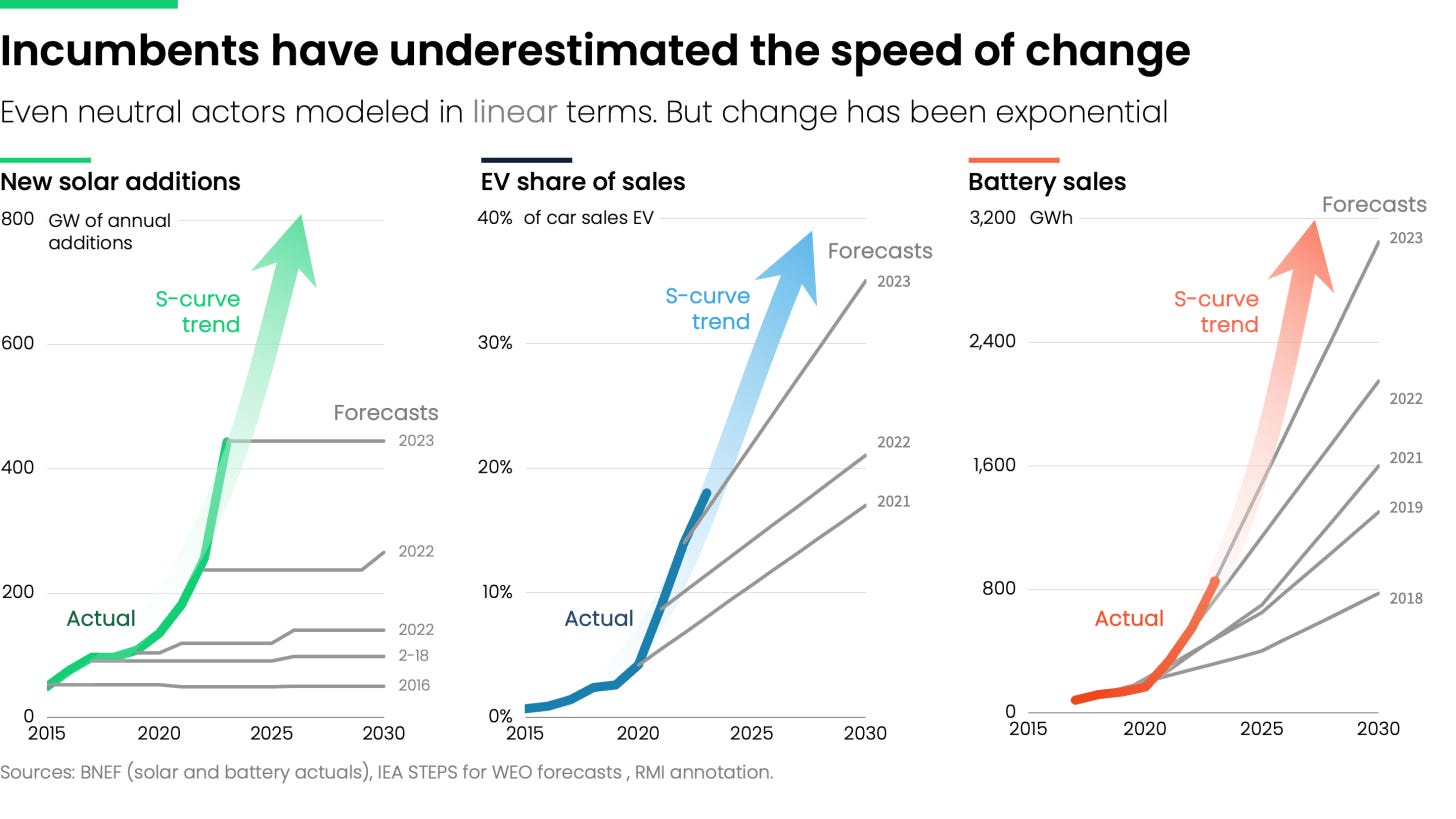


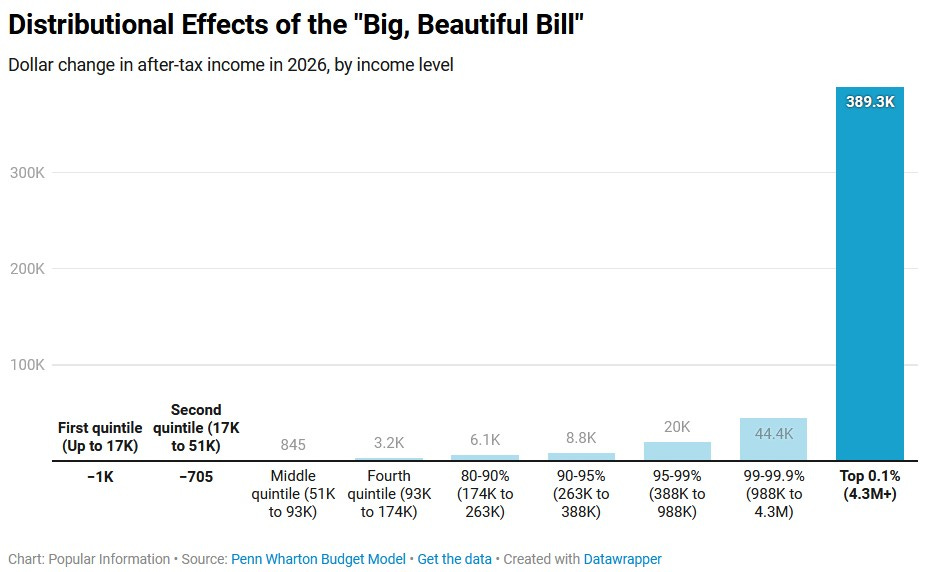

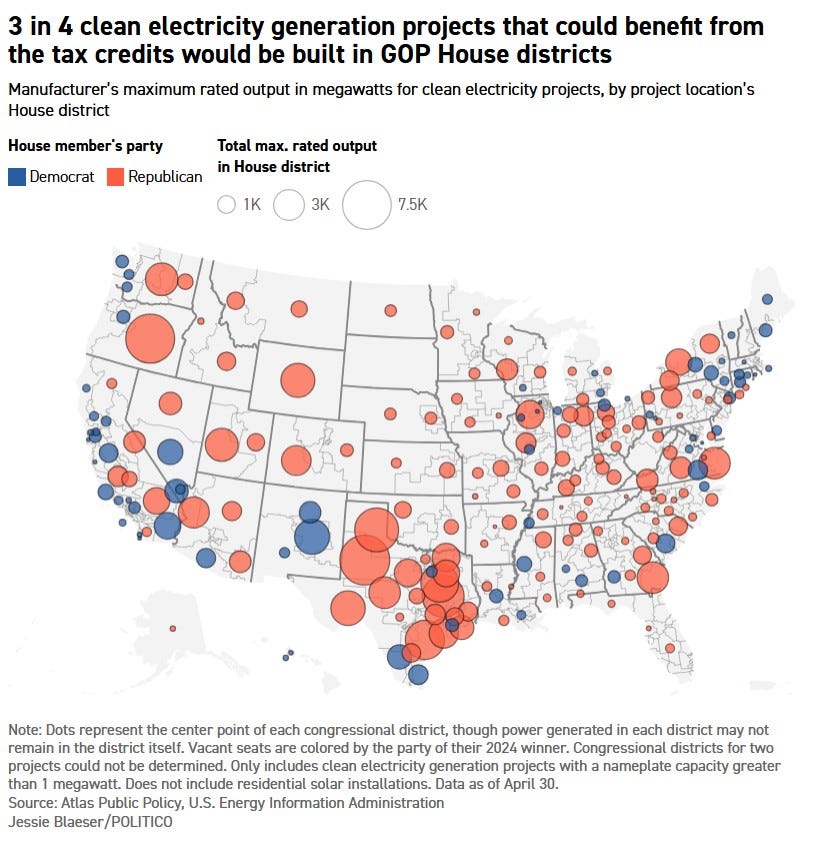




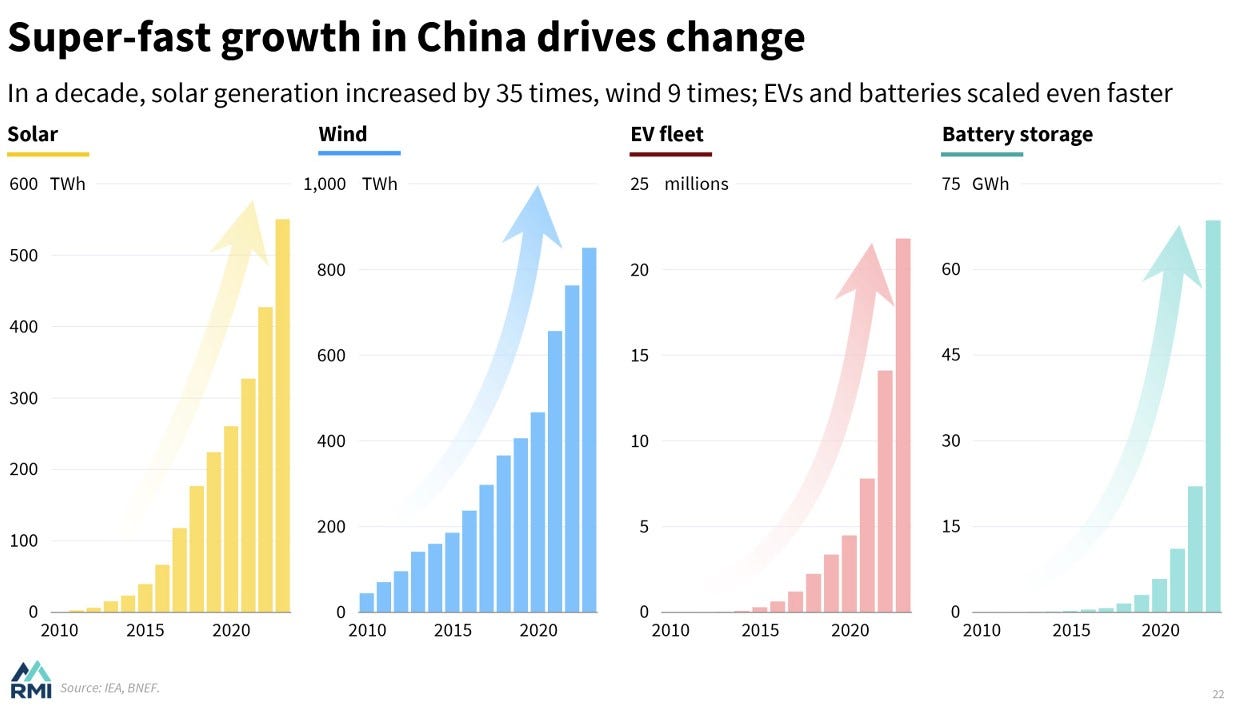
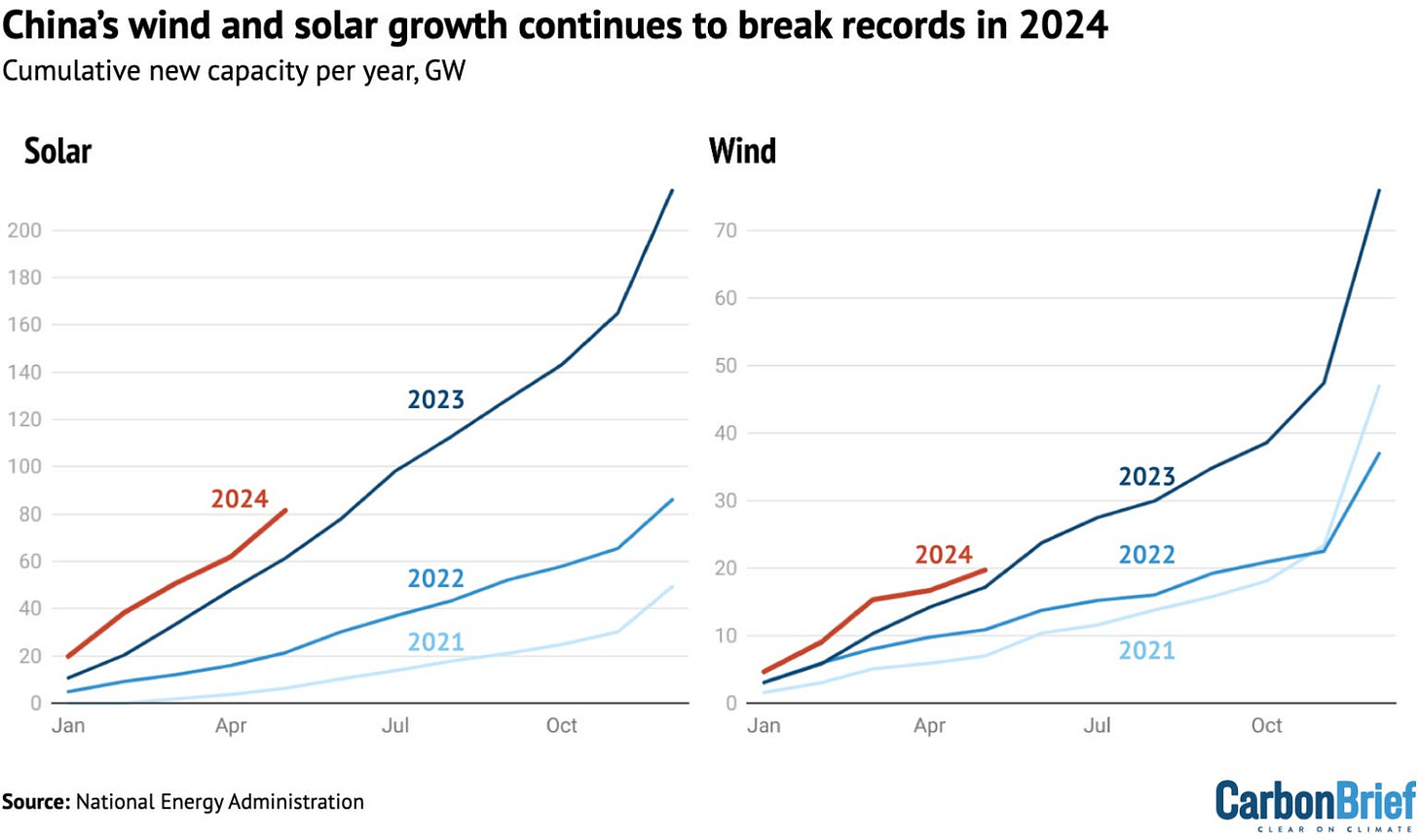

Excellent article. Thanks for the huge effort it has taken to put it together.
I am in Australia watching with horror the collapse of many of the US core beliefs.
I have been playing Substack for a while as an author but have only recently been trying to engage through "notes" with other authors thoughts and beliefs.
Sadly, I have not been able to escape the "climate denial" people and have been foolish enough to engage with them in debate. Clearly a hopeless task as they cannot separate their belief systems from facts.
Turns out that I recognise this is a much bigger problem than I appreciated. I can see that for myself much of what I hold as "facts" are in fact "beliefs" based on my judgement, education, media exposure, and the influence of my professional peers and friends. There are very few "facts" which we can establish on our own.
The earth is approximately a sphere is not something that I can personally observe to be an irrefutable fact (and many doubt it...). I hold my "belief" that it is round based on the collective "scientific" evidence from people I have learned to trust.
In the case of more complex issues such as "is renewable energy cheaper" one forms an opinion based on the "evidence" collected and presented by people one trusts. It appears that the deniers have a huge distrust of the establishment or anybody not of their view. They are then desperate to seek out and find likeminded rebels who support their distrust.
It is scary that I suspect some, perhaps many, of them are genuine in their beliefs. What elements of their education and experience lead them to trust the wrong people who would know.
That is not to say that I don't believe many have suspect motivations and know the real "facts" but choose to present another story. From the comments on their stuff, it is clear that they influence many and perpetuate the "bubble".
Cheers
Great article! Thank you for being such a straight shooter Dr Volts!